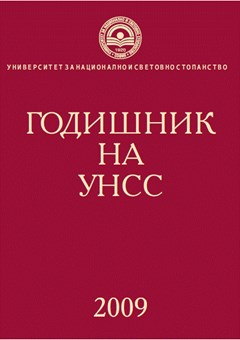Теоретични основи на макроикономическото проектиране
Author: Гарабед Минасян
Theoretical Fundamentals of Macroeconomic Projections/Forecasts/Modeling
Garabed Minasyan
Abstract
Научната студия е синтез и резултат от повече от тридесетилетен опит на автора в областта на макроикономическото проектиране. Всяко управление изисква оценка на непосредствената перспектива, очертаване на контурите на бъдещето с оглед преодоляване на възможни негативни последствия, както и за благоприятно използване на конюнктурата. Процесите се усложняват неимоверно на макроикономическо равнище, когато задължение на макроикономическия елит е да отчете и да се съобрази с пред¬почитанията на доминиращата част от обществото. При сблъсъка на интереси следва да се намери междинният път – като правило чрез използването на изкуството на обществения компромис.
Студията е структурирана в осем глави, с увод и заключение. Последователно се дискутират и оценяват различни страни на социално-икономическия живот, които предполагат и изискват съобразяване със съответната специфика при опита за проглеждане в бъдещето. Отделя се внимание за характеризиране на т. нар. парадокс на икономическото мислене, което следва да отчита историческото развитие на процесите и да съумее да очертае контурите на теоретично непознаваемото бъдеще. Разглеждат се възможностите на математическите приложения при формирането на макроикономическите проекции, като се акцентира върху техните съдържателни ограничения. Макроикономическият оптимум е обект на критика, както и опитите за налагане на своеобразно програмирано бъдеще. Изхожда се от презумпцията в теорията на публичния избор, която разглежда представителите на макроикономическото управление като изчистени от ореола на идеализирани индивиди, преследващи чистата обществена изгода. Критично се дискутира и концепцията за социална пазарна икономика, която в реалностите на прехода към пазарна икономика се натоварва прекалено силно с идеологическо съдържание.
Авторът се опитва да систематизира и анализира позициите на изтъкнати икономисти и учени на международната арена, както и в България. Идеята е да се формулира определена методология, която да стои в основата на проектирането на макроикономическите пропорции.
Abstract
The scientific study represents a synthesis and the outcome of more than three decades of the author’s experience in macroeconomic forecasting and modeling. Each management needs assessing the immediate outlook, outlining the future developments with a view to overcoming possible negative implications as well as making the best out of any propitious turn of the situation. These processes become highly complicated at a macroeconomic level when the macroeconomic managerial elite is supposed to take into account and comply with the preferences of a dominant part of society. The clash of interests has to find an expression in something in-between which as a rule resorts to the art of making social compromises.
The study is divided into eight chapters, with an introduction and conclusion. Various aspects of social and economic life are being discussed and analyzed in succession. They presume and require taking into consideration the respective specificity in attempting to forecast the look forward. A special attention is paid to characterizing the so called paradox of economic thinking which should bear in mind the historic development of processes and simultaneously draw the outlines of a future which is theoretically impossible to know. The possibilities for applying mathematical applications in modeling macroeconomic processes are analyzed with an emphasis on their content limitations. The macroeconomic optimum is subjected to criticism as well as the attempts at enforcing a kind of programmed future. The principle lies in the presumption in the theory of public choice, which examines the representatives of macroeconomic management as individuals free from the halo of idealization, supposedly seeking the pure public good only. There is also a critical discussion of the concept of social market economy, which in the real experience of the transition to market economy was loaded with too much of ideological content.
The author makes an attempt at systematizing and analyzing the views of eminent economists and scientists on the international arena and Bulgaria. The idea is to work out some methodology which should lie in the basis of forecasting macroeconomic proportions.

